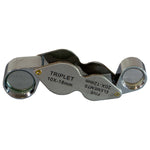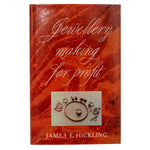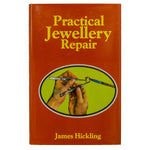
SUMMARY
TRADE ONLY! Anyone over the age of 18 may buy acids for testing precious metals for trade, business or professional use but we might need to verify this - see "Restrictions" for details.
THIS IS NOT A STANDARD TESTER! This set contains glass bottles instead of the standard plastic bottles (see the tab “PLASTIC OR GLASS?”). Glass bottles are not a standard stock item, please allow an extra few days for delivery.
Five bottle tester, tests for all carats of gold and also silver (identical to the QUICKTEST-3), plus a fourth bottle for white metals (identical to the 4th bottle the 4-bottle Troytest) PLUS a fifth bottle for testing low carat gold (e.g. 5ct to 8ct) and 9ct gold containing a lot of zinc.
Each acid changes colour when applied, and the colour (and the speed of the reaction) tells you what the metal is.
To view the instruction manual click here.
To read an article about testing precious metals
DETAIL
Troytest is the 'original' precious metal tester, invented in 1949. Quicktest bought Troytest in 2008.
Each bottle contains enough fluid for 150 tests (the 'use-by' date is printed on each label). Each bottle is transparent so that you can see how much fluid remains.
Accessories: steel needle file, powerful neodymium magnet, instructions booklet, chart (indicator disc), test-papers, polishing paper, copper sample. They all fit inside a secure (lockable) wooden box with the bottles.
The first bottle tells you if the metal is 9ct or not gold ('base' metal) or better than 9ct. It has a shelf life of 1 to 2 years (the date is printed on the bottle).
The second bottle tells you if the metal is 14ct, 18ct, 22ct or 24ct (and it's accurate enough to gauge 'in between' these readings). It has a shelf life of up to 2 years (the date is printed on the bottle).
The third bottle tests for silver (Sterling, 925 grade or 'continental' .800). It has a shelf life of up to 2 years (the date is printed on the bottle).
The fourth bottle (known as the 'green' bottle or the 'platinum' bottle) is for white metals so that you can distinguish white gold, platinum, Palladium and steel. It has a shelf life of about 1 year (the date is printed on the bottle).
The fifth bottle (known as the 'clear' bottle or 'low carat' bottle) tests for 5ct to 8ct, and also a rare alloy of 9ct that happens to contain a lot of zinc. It has a shelf life of up to1 year (the date is printed on the bottle).
The reactions are very clear, you don't have to distinguish between green, grey and brown.
-
GLASS BOTTLES
Pros:- Has a very fine applicator, you can apply a tiny spot of acid (e.g. for fine chains) or a few spots (for larger items).
- Gives more tests than a plastic bottle, because you don't have to apply as much acid.
Cons:
- The bottles do not have childproof caps, you must take extra care to keep them away from children: keep them in the box when not in use and lock the box
- If an open bottle is knocked over, all the acid will spill, causing great damage or injury
- If dropped the bottle could smash; if over-heated (e.g. in a hot car) it could explode.
PLASTIC BOTTLES
Pros:- If knocked over, it can only spill one drop
- If dropped it can't smash
- If over-heated it won't explode
- Childproof caps.
Cons:
Dispenses drops of one size (exactly 0.03ml...every time), you can't apply smaller drops.
RESTRICTIONS
RESTRICTIONS ON SALES
Anyone over the age of 18 may buy acids for testing precious metals as part of their trade, business or profession. That includes organisations, large companies, small businesses, individual traders working from home, even collectors who trade by buying and selling.
If we need more information we will email you, then please respond within 7 days, after which the order will be cancelled. So please check your emails, including your junk folder.
If we do not require any information, we will send you our standard confirmation of order with the dispatch date.
RESTRICTIONS ON SHIPPING
Acids are sent by the courier UPS using their Dangerous Chemical service. Acids cannot be sent by ordinary mail.
We cannot ship by sea. That includes any island, unless it's connected to mainland Britain or mainland Europe by a road bridge.
We cannot ship by air. That includes some remote parts of mainland Britain. This is because UPS do not operate a road service to these destinations, parcels go by air, and acids cannot be sent by air.
We cannot send acids to some of postcode areas AB, CA, HS, IV, KA, LA, PA, PH, PO, TR.
We cannot send acids to any of postcode areas BT, IM, KW, ZE.
SAFETY + DISCLAIMER
SAFETY
The fluids are acid, you will need a steady hand and good eyesight. Acids must be kept well away from children and stored upright in a cool place. If this is not possible DO NOT buy this product. Download our 4-page plain-English guide to safety. The full COSHH data sheets (114 pages) are available upon request.
DISCLAIMER
All equipment and materials must be used in conjunction with the user's skill, knowledge and experience. Under no circumstances shall QUICKTEST be liable for direct or indirect loss sustained in connection with any item. It is your responsibility to regularly check equipment against known samples to ensure that it is working correctly.
Free gift details
If you would like one of the following free gifts with this product, select one from “Select your free gift” above.

|
10X18 with 20X12 Loupe - not triplets (RRP £6.50 ) |

|
Jewellery Making for Profit [cl] (RRP £7.50 ) |

|
Practical Jewellery Repair [cl] (RRP £7.50 ) |
QUESTIONS & ANSWERS
Have a Question?
Be the first to ask a question about this.

